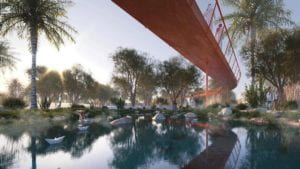It was very informative to learn about Antonios’s talk in the context of sustainability and how the UAE has sought a more prosperous future for the world to look to as a guiding principle.
An excellent example is the Ghadan 21 grant, which works to deal with issues with the city’s infrastructure. I was surprised to learn about the latest strategies aimed at mitigating the urban heat island effect. There doesn’t appear to be a single simple answer to this problem. Although concepts such as misting, white materials with properties to reflect rather than absorb sunlight, and vertical aluminum walls incorporating plants that aid in the production of air-conditioning are used, they are not mutually exclusive to one another. These ideas often combine financial sustainability and the consideration of aesthetics in order to make sustainability financially and aesthetically desirable endeavors.

first look at Abu Dhabi’s plan for public spaces and parks – Ghadan 21
I found it very interesting to hear that, thanks to the resources we have here in Abu Dhabi, there is already a minuscule effect when it comes to the overall impact of the project. Financial sustainability can be thought of as this. Even if something is sustainable in one aspect, it is not truly sustainable if it is unsustainable in other aspects.
A vital lesson I learned from this presentation was how severely the coronavirus pandemic has affected a broad range of facets of our culture, where it did not only influence our way of life, but it also caused delays to long-term efforts towards a more sustainable future. In a way, it is a reminder that if we want to help alleviate the issues associated with global pandemics and climate change, we should begin by improving our society now, as these problems can only grow worse in the future. Learning how humans would adapt to accelerated climate change was very enlightening. Having understood the impact of cities on heat islands and traffic patterns, it was very insightful to read about how urbanization creates pocket parks to help cool cities.
Leave a Reply